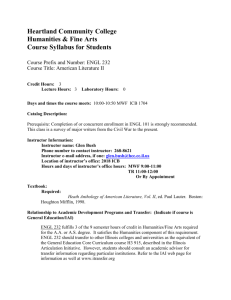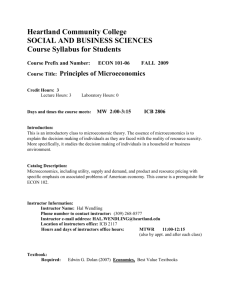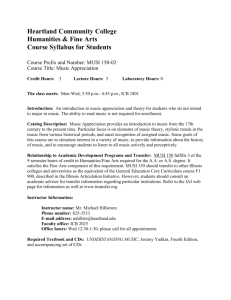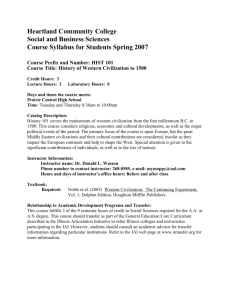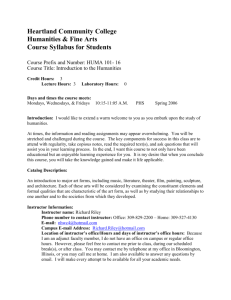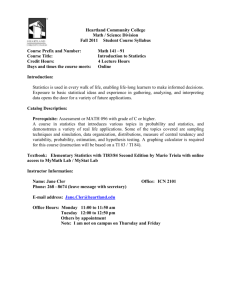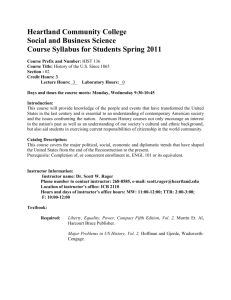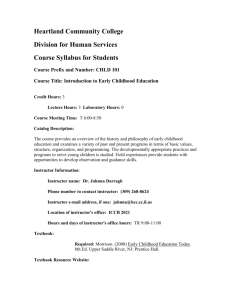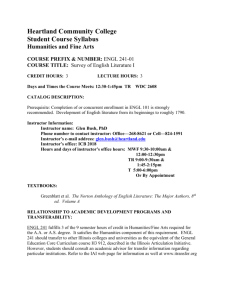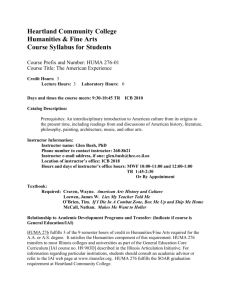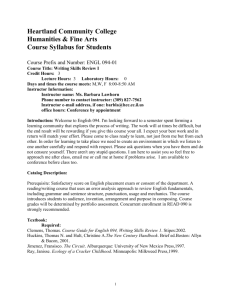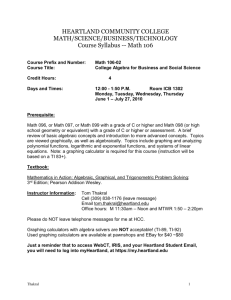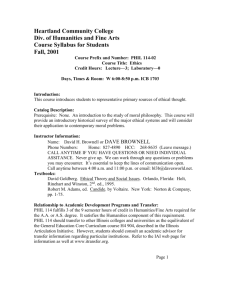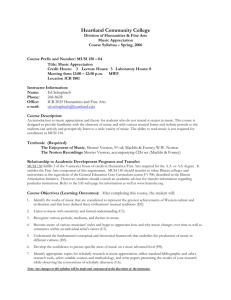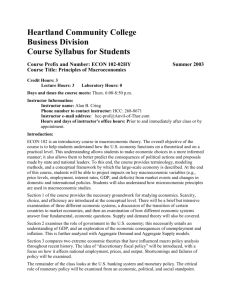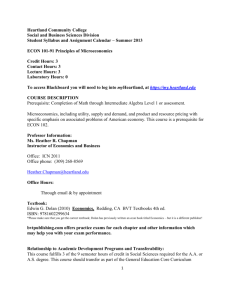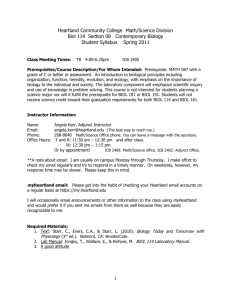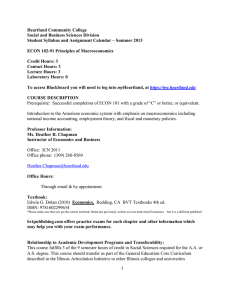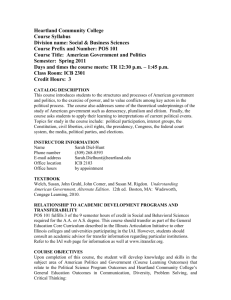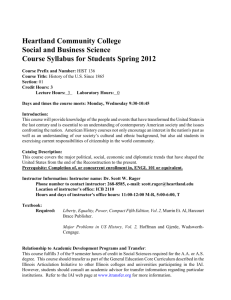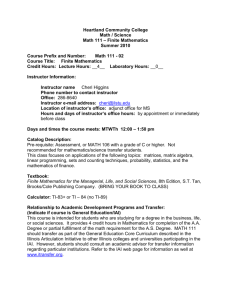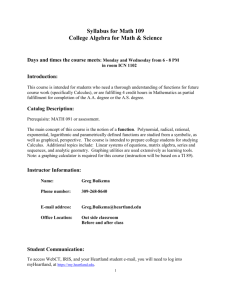[note to instructors: This is a template for creating course syllabi for
advertisement
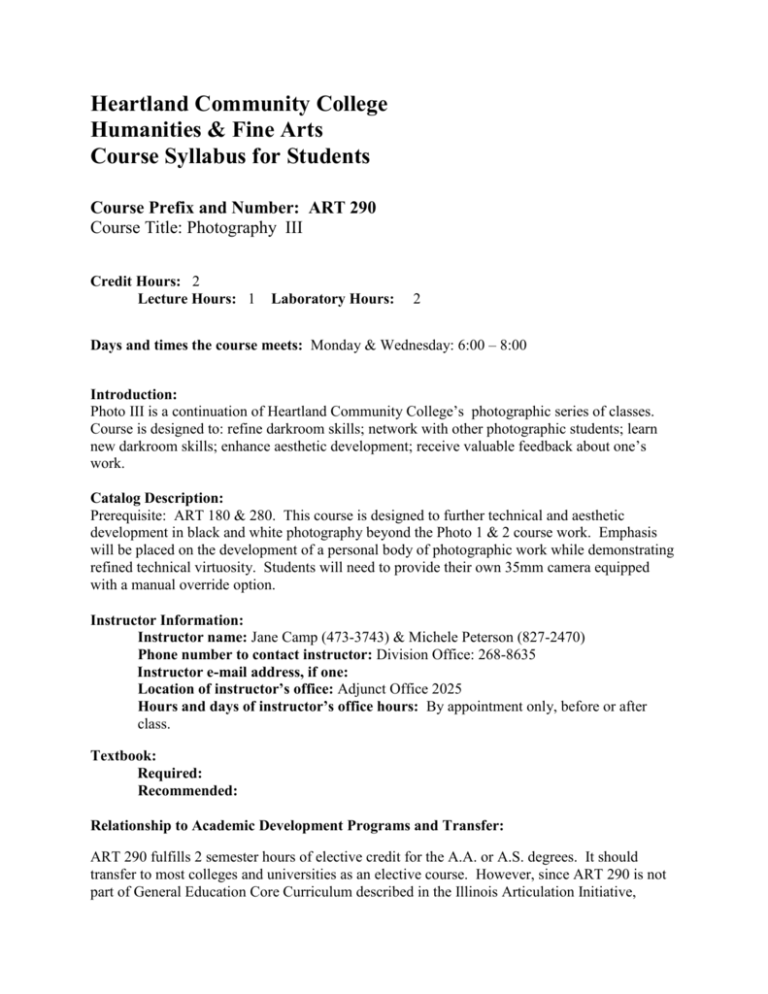
Heartland Community College Humanities & Fine Arts Course Syllabus for Students Course Prefix and Number: ART 290 Course Title: Photography III Credit Hours: 2 Lecture Hours: 1 Laboratory Hours: 2 Days and times the course meets: Monday & Wednesday: 6:00 – 8:00 Introduction: Photo III is a continuation of Heartland Community College’s photographic series of classes. Course is designed to: refine darkroom skills; network with other photographic students; learn new darkroom skills; enhance aesthetic development; receive valuable feedback about one’s work. Catalog Description: Prerequisite: ART 180 & 280. This course is designed to further technical and aesthetic development in black and white photography beyond the Photo 1 & 2 course work. Emphasis will be placed on the development of a personal body of photographic work while demonstrating refined technical virtuosity. Students will need to provide their own 35mm camera equipped with a manual override option. Instructor Information: Instructor name: Jane Camp (473-3743) & Michele Peterson (827-2470) Phone number to contact instructor: Division Office: 268-8635 Instructor e-mail address, if one: Location of instructor’s office: Adjunct Office 2025 Hours and days of instructor’s office hours: By appointment only, before or after class. Textbook: Required: Recommended: Relationship to Academic Development Programs and Transfer: ART 290 fulfills 2 semester hours of elective credit for the A.A. or A.S. degrees. It should transfer to most colleges and universities as an elective course. However, since ART 290 is not part of General Education Core Curriculum described in the Illinois Articulation Initiative, students should check with an academic advisor for information about its transferability to other institutions. Course Objectives (Learning Outcomes): Students who successfully complete ART 290 should be able to: 1. 2. 3. 4. 5. 6. 7. 8. Demonstrate the ability to produce technically accurate negatives and prints. Use various types of film and printing papers accurately. Begin to see how their work fits into the context of contemporary and art historical photography. (C5) Demonstrate both verbally and in writing the ability to critically evaluate their own photographs. (C3) Work more independently within a darkroom environment. (PS2) Solve technical problems within the photographic field. (PS1) Understand the requirements to enter professional photographic competitions. (C8) Develop a final portfolio of photographs that exemplifies a professional presentation. Course/Lab Outlines: (from Master Course Syllabus) 1. 2. 3. 4. Photographic art history Exploration of major themes in photography Verbal and written critiques Introduction to the professional field of photography Methods of Instruction: Instruction will take the form of lectures, class discussions, slide presentations, demonstrations, individual and group critiques. Course Policies: Method of Evaluation (Tests/Exams, Grading System): Final grades will be determined according to: 4 assigned projects (at 50 points each)………………………………. 4 demonstration projects (at 20 points each)………………………… Personal artist statement/goal ……………………………………….. 1 comprehensive final portfolio (10 images professionally presented) TOTAL POINTS……………………………………………………… 200 pt.s 80 pts. 20 pts. 200 pts. 500 pts. A = 500 –450 On a 50 point scale: A = 50 -45 B = 449 – 400 B = 44 - 40 C = 399 – 350 C = 39 –35 D = 349 – 300 D = 34 –30 F = 299 & below F = 29 & below Failure to complete the Final Portfolio results in an “F” for the semester grade. Grading Policy: Participation (or Attendance): Students are expected to attend all classes. Three absences are tolerated (this is for personal business, family emergencies, doctor’s appointments, etc.). Each absence thereafter will result in a 10 point deduction. Missing more than 6 classes will result in an “F” for the semester grade. Class Participation: Students are expected to participate meaningfully in the activities each class session. critiques are held after each assignment and everyone is required to attend and contribute their valid opinions. Missing a critique is an automatic 5 point deduction on a 50 point assignment; missing a demonstration results in a 5 point deduction; missing the Final Portfolio critique results in a 50 point deduction. Incompletes: There are no incompletes given for this class. Extra Credit: There are no extra credit assignments given/accepted for this class. Make-up of tests and assignments: It will be left to the instructor’s discretion regarding make-up exams. Late assignments will be marked down for each day (class session) that they are late. Deadlines: Assignment due dates are given with each assignment. Required Writing and Reading:) Writing – 5 page critical analysis on photographer’s work. List to be handed out in class. Readings from contemporary art journals and selected essays. Personal artist statement/ goal. Student Conduct: Students are expected to conduct themselves in a manner that is appropriate in a collegelevel learning environment. Anyone not adhering to conducts of common sense and common courtesy will be withdrawn from the class and given an “F” for the semester grade. Academic Integrity and Plagiarism Academic Integrity Academic integrity is a fundamental principle of collegial life at Heartland Community College and is essential to the credibility of the College’s educational programs. Moreover, because grading may be competitive, students who misrepresent their academic work violate the right of their fellow students. The College, therefore, views any act of academic dishonest as a serious offense requiring disciplinary measures, including course failure, suspension, and even expulsion from the College. In addition, an act of academic dishonesty may have unforeseen effects far beyond any officially imposed penalties. Violations of academic integrity include, but are not limited to cheating, aiding or suborning cheating or other acts of academic dishonesty, plagiarism, misrepresentation of data, falsification of academic records or documents and unauthorized access to computerized academic or administrative records or systems. Definitions of these violations may be found in the college catalog. Support Services: Heartland Library Information www.hcc.cc.il.us/library The Library, located within the Academic Support Center (ASC) on the Normal campus, provides Heartland students with a variety of on-campus resources that support both class work and personal inquiry. These include: reference tools (print and non-print), periodicals, audio-visual materials and equipment, reserves, a general circulating collection, and a fiction collection. Computer terminals provide access to various electronic resources, including Academic Universe, FirstSearch, and EbscoHost databases; CARL online card catalog, and Internet access. Several electronic resources are accessible from computers off campus. Students may borrow books from the fiction and general collections and may renew materials, in person or by phone, if requests have not been placed on them. Heartland students also have Interlibrary Loan privileges from Heartland Library. Items usually take 1 to 3 weeks from date of the order to arrive. The Library maintains a quiet study environment. Assistance is available for all library and information needs. Heartland Library is open Monday-Thursday 7:30 a.m. to 9:30 p.m., Friday 7:30 a.m. to 4 p.m., when the college is in session, but is closed on holidays that Heartland observes. Intersession and summer hours are reduced. Milner Library at Illinois State University is a public institution so you may use their collection on site. If you want to request to check out materials, ask for a free Community Borrowers card application at the Milner Library circulation desk. It is important that you have specific titles to request for check out when you apply for the card. The card will give you access to their circulating collection for three months, with a four week check out period. To qualify for this service you must live within 50 miles of Milner, have a current state ID (driver's license) with current address on ID, and be over age 18. After you fill out the application Milner will perform a background check on you for over due books, etc. For more information about Library services please call the Library at 268-8200. Academic Support Services (Academic Support Center) Lab www.hcc.cc.il.us/divisions/asc [The following material must be on every syllabi. However, this text may be updated as needs warranted. Please check either the HCC Intranet site in the Curriculum and Academic Standards folder or with the lead faculty member for the most current site.] Testing Center Lab www.hcc.cc.il.us/divisions/asc/testing The Testing Center proctors make-up exams for students enrolled in traditional courses. In addition, regularly scheduled exams for alternative delivery courses are also proctored at this Center. Exams are proctored free of charge in a secure and quite environment. For more information about exam proctoring services contact the Testing Center at (309) 268-8231. Open Computing Lab www.hcc.cc.il.us/divisions/asc/complab The Open Computing Lab provides free computing for HCC students at convenient times throughout the week. The computer lab is staffed by trained Lab Assistants and offers the use of approximately 70 computers, a scanner, a laser printer, and an electric typewriter. Course Calendar: See Attached.
